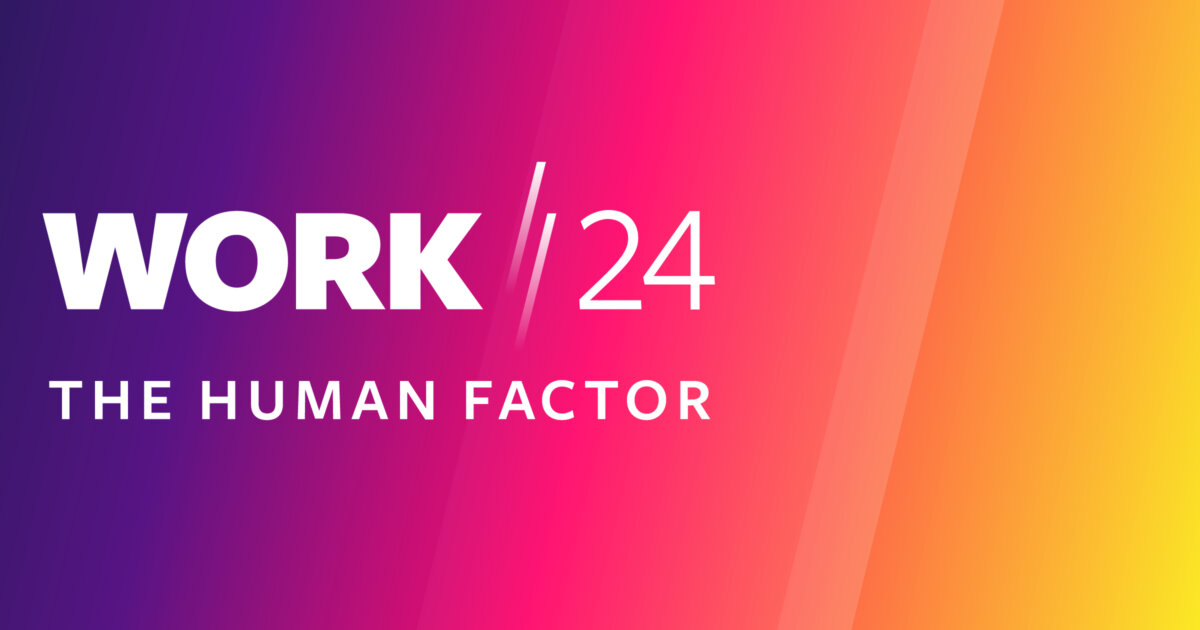Technology is given undue agency — it shifts, it disrupts, it eliminates. At Work/24: The Human Factor, a virtual summit held May 2, 2024, MIT Sloan Management Review brought together experts in artificial intelligence, change management, workplace culture, and human resources. Their goal: to help leaders understand how teams can thrive in a tech-dominated, AI-fueled world of work.
MIT SMR editor in chief Abbie Lundberg and editorial director, magazine, Elizabeth Heichler co-moderated the event.
The full video of the half-day event is available here. Work/24 included these topics and speakers:
The Leadership We Need Now
James R. (Jim) Detert, University of Virginia Darden School of Business
So many efforts focused on diversity, equity, and inclusion (DEI), employee
engagement, and the quality of work fail to make meaningful progress because power resists change. Intentionally or unintentionally, the “deep rules” of an organization make it clear which issues are safe to discuss. Companies become stronger, Detert argued, only when people take on these undiscussables.
Section time stamp: 2:01
Four Ways AI Is Changing Workforce Ecosystems
Elizabeth J. Altman, University of Massachusetts Lowell; David Kiron, MIT Sloan Management Review
Workforce ecosystems, which weave together actors from within organizations and beyond, have become more complex with the introduction of AI. Altman and Kiron detailed their research into these ecosystems, explaining how artificial intelligence is augmenting human performance and expanding access to decent jobs — while also undermining worker autonomy and equity.
Section time stamp: 33:10
Reinventing the Organization With Generative AI
Ethan Mollick, The Wharton School of the University of Pennsylvania; interviewed by Kaushik Viswanath, MIT Sloan Management Review
How are generative AI technologies being deployed today by workers, managers, and organizations to unlock productivity and new possibilities? Mollick talked about the types of applications generative AI is ready for, what kinds of experiments organizations should be running, and what precautions they should they take as workers use AI in their jobs.
Section time stamp: 1:04:25
Smarter Strategies to Beat Employee Burnout
Melissa Swift, Capgemini Invent
Burnout continues to plague organizations. Both leaders and employees are grappling with the impact of decades of work intensification — and the realities of hybrid work. Swift noted that while a host of superficial tactics have proved unsuccessful, some companies are using evidence-based strategies to truly refresh and reenergize a tired working population.
Section time stamp: 1:34:26
DEI Leadership: What It Takes to Achieve Real Change
Malia C. Lazu, MIT Sloan School of Management
The history of the U.S., Lazu said, is a history of the fight for inclusion — by enslaved people, Native Americans, and women, all of whom were diminished in the founding documents. Asking those with power to make room for others is extremely hard. Lazu outlined how moving from intention to actual impact requires managing a lot of pushback.
Section time stamp: 2:03:59
The Impact of Generative AI on Work
Peter Cappelli, The Wharton School of the University of Pennsylvania
How useful are large language models (LLMs) in the workplace, really? Cappelli said that despite their capabilities, LLMs are more complicated to implement than we typically acknowledge and are likely to create new roles to check output for errors and adjudicate dueling results. He noted that if we ask LLMs to perform entry-level work, we’ll need new ways to mentor young workers.
Section time stamp: 2:35:55
How to Create Good Jobs and Thrive as a Business
Zeynep Ton, MIT Sloan School of Management
Companies that suffer from poor customer service and high employee turnover have broken management systems. Mental models held by company leaders around how much they can pay front-line workers often lead to low, unlivable wages. Ton described how retailer Sam’s Club profitably addressed its problems by focusing on the interconnectedness between its people and their ability to serve customers.
Section time stamp: 3:05:32
Closing Remarks
Abbie Lundberg, Editor in Chief, MIT SMR; Elizabeth Heichler, Editorial Director, Magazine, MIT SMR
Change is hard. Lundberg noted that throughout the event, attendees were challenged to confront new realities and old mindsets, and to take concrete steps for positive change.
Section time stamp: 3:36:04
Event Notifications
Get periodic email updates on upcoming webinars, panel discussions, and other special events.
Please enter a valid email address
Thank you for signing up
“The MIT Sloan Management Review is a research-based magazine and digital platform for business executives published at the MIT Sloan School of Management.”
Please visit the firm link to site






